
This is the old chestnut that will not die.
Let me first invite all those Americanists reading this article to do their best, if they can, to put aside their particular prejudices and try to view this issue objectively.
I realise that for some that is simply mission impossible.
Well, I am sorry for them but I believe that there will be some who - with a bit of effort - can do it.
It is to them - and not the blinkered bigots - that I address the argument that follows.
All men feel a strong affinity to and for their own country - and so it should be - but that should not ever blind them to their country's particular faults. Indeed, if they really love their own country then they would be at pains to discover its faults, admit them and try to do something to overcome them.
The man who says "my country, right or wrong" does not truly love his country.
In the case of America the problem is trebly exacerbated by the false myth that so many Americans naively believe that their own society and system of government is the best that the world has ever seen and ought to be aspired to by all peoples throughout the world. This blinkers their capacity to view their own country objectively more than the people of most other countries.
The Americanist idea that America is the acme of civilisation and that it has the right to spread its own culture and form of government to the rest of the world is part of the purely exploitative myth of so-called "
manifest destiny".
It was devised by the Founding Fathers to give themselves an excuse to invade and annex territory that belonged to Spain and to the native American Indians and, later, to control Latin America for the benefit of rich Yankees rather than the common good.
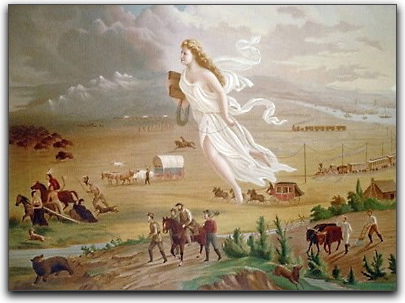 The Americanist doctrine of "manifest destiny" was a self-fulfilling, circular argument of zero logical weight invented by Yankee revolutionaries and supremacists as a convenient philosophical veil to cover the gross and grotesque rape of the native American Indians, and of the Spanish territory upon which they mostly dwelt, solely for the private profit of Yankee Americans. That is the truth about "how the West was won".
The Americanist doctrine of "manifest destiny" was a self-fulfilling, circular argument of zero logical weight invented by Yankee revolutionaries and supremacists as a convenient philosophical veil to cover the gross and grotesque rape of the native American Indians, and of the Spanish territory upon which they mostly dwelt, solely for the private profit of Yankee Americans. That is the truth about "how the West was won".It was little more than a cloak for greed and exploitation - exploitation that even continues to this day, in new and different forms.
There is very little that is just in such a viewpoint and much that is very unjust. Blind bigotry and false loyalty to such a view is not a virtue but rather a species of sin.
On the other hand, honest and decent Americans are fine people, many some of the finest, who have given the world much and can do yet more for the world in the future. They are the Americans who are able to distinguish the virtue of love of country from bigotry and America from the error of Americanism.
Since America is now the world's policeman, it is all the more important that its citizens understand their own history and understand the flaws as well as the triumphs.
Failure to do so has already cost lives and the prospect of peace in a number of countries.
The Serbs were able to throw back in the face of the American negotiators the simple fact that America had staged its own revolution, that it had believed in its own "manifest destiny", that it had "ethnically cleansed" the country of native American Indians and that it still believed in its own intrinsic superiority over other nations.
Madeleine Albright's typically Americanist negotiating stance was to say to the Serbs that they had 2 choices: hand over their country now or else America would invade and take it over. What kind of preposterously arrogant negotiating position was that for any responsible country to take?
Moreover, the decision to invade Iraq for a second time might have been viewed more circumspectly if the American leaders had understood a bit more about their own history and its particular flaws.
Just WarWhat makes a war just?
The traditional teaching is set out in the writings of St Augustine and St Thomas Aquinas particularly.
It can be summarised as follows.
Jus ad bellum (the morality of going to war) requires all of the following 6 conditions to be fulfilled:
1.
A just cause - e.g. righting a wrong, protecting the innocent or restoring rights wrongfully denied or taken away. Vengeance or reprisals or the prestige of the sovereign are not sufficient reasons.
2.
Proportionate cause - the cause must be sufficiently weighty to justify the very serious step of waging war with all its attendant evils.
3.
Right intention - we must have a good intention, as with all moral acts e.g. to create a better situation than the situation pertaining before the war.
4.
Right authority - only those with the proper, sovereign, legislative authority to declare war may do so. War may not be declared by private citizens.
5.
Reasonable prospect of success - quixotic gestures are not appropriate in going to war.
6.
Last resort - every reasonable way of avoiding war must first be exhausted. Jaw, jaw is better than war, war.
 St Augustine of Hippo: the greatest of the Latin Fathers of the Church, first codified teaching on a just war
St Augustine of Hippo: the greatest of the Latin Fathers of the Church, first codified teaching on a just war
(morality in waging war) requires the following conditions to be met:
1.
Discrimination - we must not deliberately attack the innocent and the non-combatant.
2.
Proportionality - we must not take action which might cause disproportionate harm relative to the likely benefit of the war. This is similar to the doctrine of "minimum force" necessary to achieve one's military aim.
Was the American revolution a just war?American children are taught from an early age that it is axiomatic that the American Revolution was a just war.
It has become a dogma of the Americanist faith and American children are not permitted even to question it, let alone challenge it.
Any objective person (which rules out most Americanists) must, however, consider the case on its merits.
A fortiori, a Catholic must do so, too.
All 6 of the reasons are considered by many authors to be lacking in the American revolutionary war but I will consider but one which I think sufficient to call into question the morality of the whole enterprise.
It is this:
the lack of right authority.
By what authority did the American rebel colonists claim the right to rebel against their sovereign?
The simple fact is that they had no such authority. Neither did they claim it. Instead they simply adopted the view of the English Whigs, going back to Oliver Cromwell, in claiming the right to decide if and when the sovereign was ruling unjustly and
on that basis gave themselves the "right" to rebel.
This, of course, is not only completely contradictory to Christian and Catholic doctrine and principle but is, also, a recipe for anarchy.
 Imitating but exceeding the Americans, the French liberals went on to stage a disgustingly savage revolution of their own. The result was that the revolutionary leaders themselves later went to the guillotine, like Maximilien Robespierre, the leader during the "Great Terror" but later himself executed (above).
Imitating but exceeding the Americans, the French liberals went on to stage a disgustingly savage revolution of their own. The result was that the revolutionary leaders themselves later went to the guillotine, like Maximilien Robespierre, the leader during the "Great Terror" but later himself executed (above).
If any group of citizens can give themselves the right to overthrow the sovereign state whenever they consider that ruler to be unjust then no society is safe.
It is true that no-one is morally obliged to obey an unjust law and that they may refuse to obey it but that is a very different thing from going on to the much further stage of actually overthrowing the maker of the law.
It is also true that if the sovereign state attacks the individual or the group unjustly that the individual or group may take reasonable and proportionate means to defend themselves from such attack but, again, that is a far cry from intentionally plotting to overthrow the sovereign state.
The principle of double effect would allow an intentional defence against the attacks of the sovereign state even if that foreseeably, but not intentionally, opened up the possibility of the state falling but, again, that is a far cry from intentionally plotting to overthrow the sovereign state.
St Thomas puts the matter thus (
De Regimine Principum, Cap 6, 45-6):
"If the excess of tyranny is unbearable some have been of the opinion that it would be an act of virtue for strong men to slay the tyrant and to expose themselves to the danger of death in order to set the multitude free... but this opinion is not in accord with apostolic teaching."There you have it.
 St Thomas Aquinas, greatest of all Catholic theologians, condemned revolution as "not in accord with apostolic teaching
St Thomas Aquinas, greatest of all Catholic theologians, condemned revolution as "not in accord with apostolic teaching"
St Thomas explains that this is because St Peter admonishes us to be reverent and obedient to our masters both good and bad
(
1 Pet 2:12-20) and that we cannot overthrow our masters.
A sovereign person or body may only be overthrown by that which is higher, teaches St Thomas. For example where a king is chosen by a senate or a popular assembly then either of those bodies may depose the king since they are prior to the king but if the king is chosen through birth then he cannot be deposed by any of his subjects since they are not, then, prior to him.
The American rebel colonists simply and wholly rejected this teaching of St Thomas, just as the rebellious Protestants did at the Protestant Reformation, just as Cromwell did and just as the English Whigs did. Indeed, the American rebel colonists expressly and openly averred that they were following the English Whigs in overthrowing King George III, just as the English Whigs had overthrown King James II, our last Catholic king.
There is simply no escaping this. Americanist Catholics must simply just get used to it.
The suggestion that the American rebels were not rebelling because the Hanoverians had no right to rule is contradicted by the American rebel colonists themselves. The American rebel colonists were certainly not seeking to restore the Stuarts. On the contrary, they were even more anti-Stuart than the English Whigs.
In any case, one rebellion does not legitimate another because two wrongs do not make a right and one may not do evil that good may come of it, as St Paul teaches us (
Rom 3:8).
 King George III in coronation robes
King George III in coronation robes
King George III had the right to ratify legislation. The American rebel colonists did not. The
de facto government has all the authority of a real government unless it is open to realistic challenge. The alternative would simply be anarchy which is always wrong. By the reign of King George III no-one was really challenging his right to rule in place of the Stuarts.
Moreover, Henry Benedict, Cardinal Duke of York and the Stuart successor, recognised King George III. By the time of King George III the rule of the Hanoverians had become legitimate, recognised by pope, emperor and pretender alike.
One of the most loyal of Stuart loyalists and the very person who had hidden, nursed and nurtured Prince Charles Edward Stuart ("Bonnie Prince Charlie") after the Battle of Culloden in 1745 was Flora MacDonald.
 Flora MacDonald receiving Prince Charles Edward Stuart when he was on the run from the English and Scottish Whig rebels after the Battle of Culloden. She later went to America and was there a Loyalist, rejecting the American Whigs just as she had the British Whigs.
Flora MacDonald receiving Prince Charles Edward Stuart when he was on the run from the English and Scottish Whig rebels after the Battle of Culloden. She later went to America and was there a Loyalist, rejecting the American Whigs just as she had the British Whigs.
She later went to America and there she and her husband were active loyalists, supporters of King George III as King of America and strongly opposed the rebel colonists whom she regarded as unnatural rebels against proper authority, just as she had earlier regarded the English Whigs as rebels against the proper authority of the Stuarts.
That is, I think, precisely illustrative of the true Catholic position and shows the sound Catholic sense of Flora MacDonald.
 Prince Henry Benedict Stuart, Cardinal Duke of York and the head of the House of Stuart after his brother's death. He recognised the rule of King George III during his life (despite leaving the matter ambiguous in his will). He sent the Scottish coronation heirlooms to King George and received a pension from the King.
Prince Henry Benedict Stuart, Cardinal Duke of York and the head of the House of Stuart after his brother's death. He recognised the rule of King George III during his life (despite leaving the matter ambiguous in his will). He sent the Scottish coronation heirlooms to King George and received a pension from the King.
What I would ask is this: how can anyone defend the rebellious Yankees, if they reject as rebellious the Hanoverians?
The American War of Independence was not made just by British injustice. As St Thomas teaches, private citizens do not have the right to pass judgment on their own sovereign and to overthrow him, even if that sovereign is passing unjust laws and acting unjustly.
In any case, it was the American rebels who behaved unjustly, at least as much as the British government. A mere "feeling" that one can "no longer bear British rule" does not even begin to satisfy the traditional tenets for a just war.
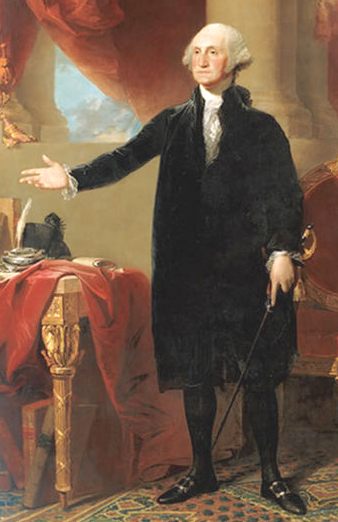 George Washington, leader of the rebel colonists
George Washington, leader of the rebel colonistsThe rebel colonists were, in truth, a parcel of Whigs and they had imbibed the false and treacherous teachings of the English Whigs and men like Cromwell and had persuaded themselves that they could make out a case for overthrowing the relatively mild rule of King George III, make themselves the rulers and so profit handsomely from a revolution.
In short, it was
they who were unjust far more than King George. Indeed, the rule of King George III and his government was milder than that of the rebel colonists and it was during his reign that the unjust penalties against Catholics and dissenters had begun to be withdrawn or not enforced.
Though it must be admitted that King George still retained prejudices against Catholics, his reign was a vast improvement on that of his odious predecessors and it was during his reign that the first Catholic chapel was built. This was on the Lulworth Castle estate of Sir Joseph Weld, Bt, in Dorset.
Indeed, King George's government had passed the
Quebec Act which recognised Catholicism as the religion of the French Canadians. How did the American rebel colonists react to this? They called it an "intolerable Act" and cited it as an example of the "tyranny" of King George!
Thus one can readily see the extent of the anti-Catholic bigotry of the American rebel colonists.
The rebel colonists also saw a huge financial advantage to themselves personally from the revolt and the example of the Boston tea party is a good case in point.
Far from there being expensive tea imported, the British government had allowed tea imports to provide cheaper tea to the colonists. The rebel leaders, however, stood to lose the considerable profit they were making on their own expensive tea by these cheaper imports and so they staged the "Boston tea party" to oust the competition against their own tea monopoly.
They were, in short, not only anti-Catholic bigots but also greedy profiteers at the expense of their fellow American colonials.
 Tom Paine: atheist radical and model for many of the American revolutionists
Tom Paine: atheist radical and model for many of the American revolutionistsThey then tried to turn their greed and selfish profiteering into a principle by pretending that the whole colony was being oppressed by the British government when, in fact, the opposite was true. It was
they who were oppressing their fellow colonials.
They also oppressed the non-white minorities and kept slaves for their own benefit and profit. It was of these rebel colonists that Dr Johnson so rightly said:
"Why is it that the yelps for liberty come loudest from the drivers of slaves?"The American revolution was illegitimate from the beginning and was a war by, and for the benefit of, a small group of colonial oligarchs who sought to enrich themselves by overthrowing the legitimate government and putting themselves at the head of a new, oligarchic government which was thereafter run chiefly for their own benefit and profit.
 Thomas Jefferson: Dr Johnson had him in mind when he wrote "Why is it that the yelps for liberty come loudest from the drivers of slaves?"
Thomas Jefferson: Dr Johnson had him in mind when he wrote "Why is it that the yelps for liberty come loudest from the drivers of slaves?"
A government that is run for the profit and benefit of the few and not chiefly for the common weal is called a tyranny (or unjust oligarchy), as St Thomas teaches.
Such were the American rebel colonists. Moreover, their revolution was not a just war.
Generations of American children have been taught the opposite. They have, however, been taught wrongly and falsely. An objective person can see this. A prejudiced person - as most Americanists unfortunately are - cannot.
The real absurdity is that so many modern Americans have been duped into thinking that their own society which, even now, is not run for the benefit of all but chiefly for the benefit of the few rich, is the very acme of freedom.
They have so much imbibed the myth and the propaganda that they can no longer even recognise what freedom really is.
They slave away for employers who exploit them and give them only 2 weeks "vacation" and they honestly think this is the very pinnacle of freedom.
The new slaves have persuaded themselves to love their own enslavement, even though it is often far more oppressive than the conditions of most slaves in the old South.
Does this mean that America should now be forced to recognise the Queen (or even the Duke of Bavaria) as their head of state?I only pose this question because I am sure that some dumb bunny will try to raise it (whether stupidly or sarcastically) in order to try and make a cheap point.
The answer, of course, is no.
No - no more than should the British Crown be forcibly handed back to the Duke of Bavaria, even though he is undoubtedly the true head of the legitimate House of Stuart.
Why?
Because to do so would once again require an insurrection or, at the very least, a
coup d'etat both of which actions would fail miserably to satisfy the criteria for a just war, almost as much as did the American revolutionary war fail to satisfy the same just war criteria.
 HRH Francis, the Duke of Bavaria, with his niece, HRH Princess Elizabeth, who is expecting a child. The Duke remains the head of the excluded Catholic House of Stuart.
HRH Francis, the Duke of Bavaria, with his niece, HRH Princess Elizabeth, who is expecting a child. The Duke remains the head of the excluded Catholic House of Stuart.Of course, if the Duke could become King (assuming that he was willing which is at best doubtful) by voluntary means, by the consent of Parliament and people, then, of course, there could be no objection.
But is that likely? No.
Jacobites (like myself) can entertain the just and pious hope that the legitimate Stuart king might one day be restored to the throne of Britain but we cannot for one moment ever seriously entertain the entirely fanciful notion that any such restoration should today be imposed by force of arms or by
coup d'etat.
The time for that sort of action - right though it may have been in 1715 and 1745 - is now long, long gone and it would be the height of immorality, unconstitutionality and folly to attempt such a criminal enterprise with any degree of seriousness. In attempting such, we would be no better than the terrorists of
Al Qaeda or the IRA.
The issues are currently under discussion, however, due to the proposal by Gordon Brown to scrap the
Act of Settlement 1701 which excludes all Catholics from the British Crown. See this report:
http://www.telegraph.co.uk/news/uknews/1584184/Act-repeal-could-make-Franz-Herzog-von-Bayern-new-King-of-England-and-Scotland.htmlIt is even less likely that the Congress and the people of the USA would ever consent to a return to the Queen as head of state.
Indeed, the issue is irrelevant to the point of this essay.
My aim was to examine the conditions for a just war and see if they applied to the original American revolutionary war and then to see how the continued "dogma" of faith in the recititude of the American revolution influences and affects modern US cultural and political discourse and policy.
...
 Fair question!
Fair question! The Prophet Elias (Elijah) rising to heaven in a fiery chariot as the Prophet Eliseus (Elisha), his successor, looks on in awe crying out "My father! My father! The chariot of Israel and the driver thereof!"[4 Kings 11]
The Prophet Elias (Elijah) rising to heaven in a fiery chariot as the Prophet Eliseus (Elisha), his successor, looks on in awe crying out "My father! My father! The chariot of Israel and the driver thereof!"[4 Kings 11] The Shroud of Turin: a relic of the burial shroud of our Lord miraculously imprinted with the Holy Face
The Shroud of Turin: a relic of the burial shroud of our Lord miraculously imprinted with the Holy Face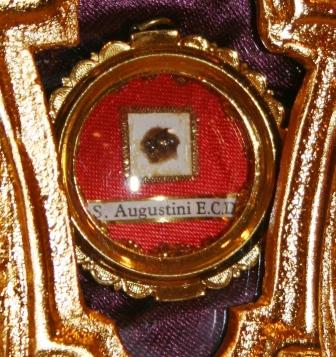













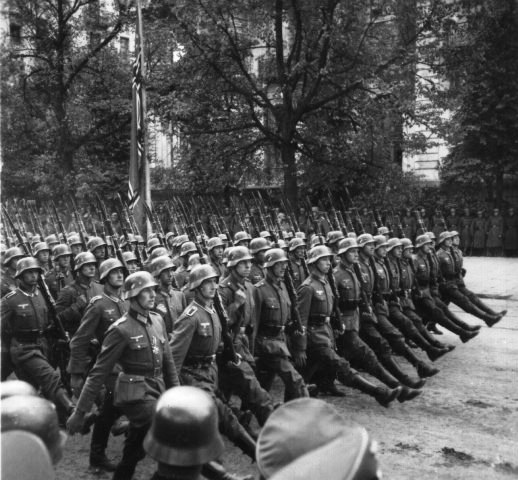


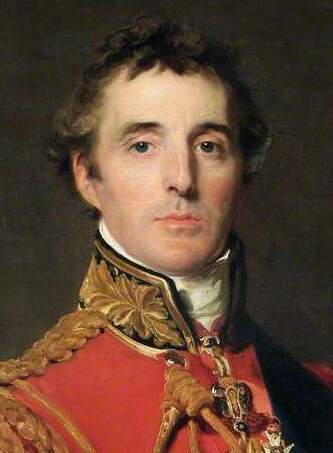

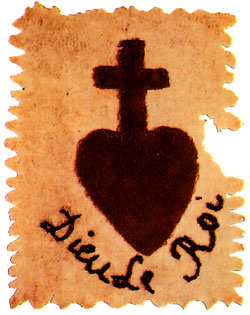




























.jpg)

























_-002.jpg/220px-Circle_of_Anton_Raphael_Mengs,_Henry_Benedict_Maria_Clement_Stuart,_Cardinal_York_(ca_1750)_-002.jpg)


